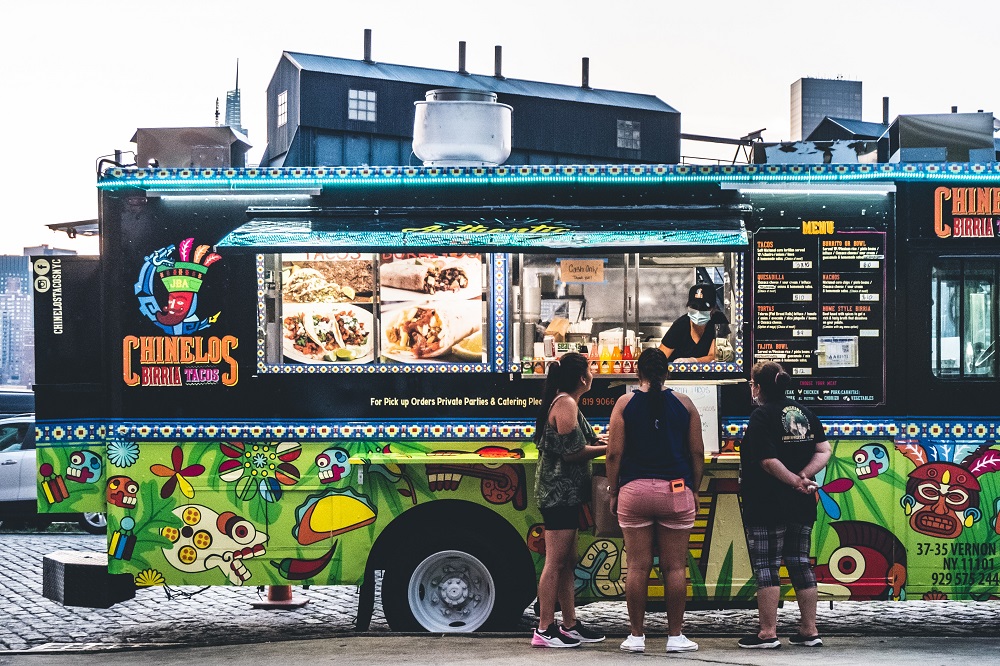Requirements to Open a Food truck
Requirements to Open a Food Truck
Starting a food truck is an exciting opportunity to share your passion for food while setting up a profitable business. It has been an exciting time to open a food truck business in the last few years. However, the silver lining during the global pandemic is a need for food trucks in every community to step up and serve hungry customers. When most restaurants closed during the pandemic, it seems like only food trucks and drive-thru businesses remained open in Seattle. This means food trucks played an important role in our communities.
Still, the food truck industry has a healthy demand from customers and a lot of room to grow.
When starting a food truck, among your first things requirements is to create a delicious menu that appeals to your target market, develop a food truck brand, and hit the streets.
Is opening a food truck that easy?
Certainly, it takes a little more effort than that (and we’ll be discussing that effort in detail). After all, a food truck business is a real restaurant business on wheels that requires planning, research, and a lot of effort. Regardless of which food truck concept you choose or the menu you plan to offer, there will be requirements for you to consider.
In today’s article, we will discuss some of the requirements for opening a food truck.
While some of the requirements for food trucks are based on laws, most of the requirements are based on bureaucratic regulations that governing agencies put together. These agencies include the county health department, buildings department, and others.
The point of these requirements is to protect you and your customers, while others are simply to create good business practices.
How to Open a Food Truck
What are the Requirements to Open a Food Truck?
Opening a food truck requires specific steps to make sure you have a high probability of success. A food truck is not quite like any other retail business. It is a restaurant on wheels, equipped to serve food anywhere it deems necessary. This ability is both exciting and challenging. By addressing the requirements that we list below and focusing on the regulations on your specific area, your food truck will have a higher probability of success.
Here’s a list of the vital requirements below on how to open a food truck:
- Create your business structure
- Develop a plan
- Understand your target market
- Find a great location
- Get the money to start your food truck
- Develop a food truck brand
- Get training
- Find a commissary
- Build out your coffee truck to code
- Apply and receive your licenses and permits
- Hire great staff
- Market your business
- Deliver great food every time
These are essential steps that are done to increase your chances of success. Some of these steps are required before you serve customers or hire employees.
While you are a restaurant on wheels, you still have requirements and regulations that you are obligated to follow. Some of these requirements may change depending on your food and beverage menu as well as your location. Nevertheless, meeting those requirements is essential to do as long as you own your business. For a more in-depth article on how to open a food truck, please read, How to Open a Food Truck Business?
Let’s take a deeper look at the food truck opening requirements listed below:
Requirements to Open a Food Truck Business
Create your business structure
While you may be a restaurant on wheels, you still need to create a business structure. Of course, your business structure can vary, but most food truck business owners start an LLC.
After creating your business structure, you can do essential business functions like opening a bank account, applying for workers comp insurance, and a resellers license, among others.
Develop a plan
Starting a food truck takes a lot of planning. There is no “winging it” to food truck success. It is recommended that before you launch your food truck business that you write out a business plan. Your business plan will contain a lot of necessary elements of your business that you should consider. In essence, your plan will be your road map to get your food truck business off the ground.
Elements of a food truck business plan include:
- Your food truck concept
- Business structure and management
- Food truck menu
- Target market
- Budget
- Forecasted profit projections
- Location
- Operations
- Marketing and promotion
- Exit strategy
Understand your target market
Knowing your food truck customer will be an essential basis for your success. Understanding what they want and what they are willing to pay is an integral part of your planning.
Get to know your target market.
Find a Great Location
Your success will ultimately depend on your location. Even if you serve the best food, you’ll struggle to make sales if you are in the wrong location. Start early in searching for an appropriate food truck location to serve the customers you want to reach.
Depending on where you serve, you’ll have to make arrangements with property owners and even local city agencies.
Get the Money to Start Your Food Truck
Starting a good truck takes money. While there are a variety of low-cost decisions you can make, you have to have still some capital to make the initial investment in your food truck.
Your job is determining where you will get the money to start your food truck business. But, of course, before this, you will want to understand just how much you will need to buy your food truck – therefore creating a realistic startup will be important.
You might utilize your savings, borrow from family or your friend, or apply for a small business loan. Your finance pools will be a key part in launching your business so be sure to figure out your potential funding sources early.
Requirements to Open a Food Truck

Develop a Food Truck Brand
Your food truck brand will help set you apart from the local competitors. In a crowded market, your brand will get you noticed and hopefully drive more sales.
Your brand will bring together various elements, including your menu, your target market, and your idea of who you want to serve.
Indeed, your coffee truck branding will be a crucial identifier in any market. It will help you generate the awareness you need to stand out, deliver your messaging, and keep your fans and followers in the know.
Get Food Truck Training
If you have worked on a food truck or in a commercial restaurant setting, you should have gained significant experience and training. As you plan out your business, you may consider getting some invaluable experience or one-on-one training.
Training will help make you more efficient, save money, and make your overall job more manageable. If you can’t get training or don’t have the time, consider other essential informational resources. Read our information food truck blog and food truck guide. Additionally, getting online barista training to help you better serve coffee is also essential too.
Further Reading: How to Open a Food Truck with No Experience
Find a Commercial Commissary
Most food trucks require their food to be prepared at a different location that adheres to health department regulations – either a commissary or a restaurant environment.
Local health departments often require commissaries. A commissary is often used by mobile food trucks, coffee trucks, and other mobile services that sell food. A commissary allows you to clean, prepare, cook, and store your food safely. Often you will have to rent the space or time that use your commissary services.
Build out your Food Truck to Code
Whether you buy a new food truck or decide to refurbish a used food truck, you will need to build your food truck to code.
Each state, county, or regional government will have dedicated agencies that approve your food truck to operate legally. These agencies provide detailed rules, regulations, and codes that must be followed to run your food truck business.
I recommend that before starting any work on your food truck or purchasing a food truck, you should review the codes in the county and state by which you plan on working.
Apply and Receive your Licenses and Permits
Before you can operate your food truck legally, you will need to apply for your licenses and permits.
Keep in mind that often the application for your food truck permits is a process. For example, you may apply to schedule an inspection at a future date.
The food truck buildings inspection will cover your electrical and plumbing installation. At the time of contact with your agency (usually the building department), you will be sent a list of requirements. You want to make sure that you can pass those requirements before you have your inspection. A second inspection will most likely cost additional money, so it is in your interest to get it right the first time.
Hire Great Staff
Hiring great staff will be a key objective as a food truck business owner. Unfortunately, finding reliable, honest, and competent staff isn’t always as easy as it seems, so start early.
Ideally, it would be good to hire staff that has some experience working on a food truck or in a commercial kitchen. As you may know, working in a kitchen environment is quite challenging. Investing time, effort, and energy hiring and training an employee that hasn’t been in a kitchen may only spell high-turnover rates.
Market your Food Truck Business
If you know your target market, you know your menu, and you have a good idea of your brand and what you’re messaging you would like to have, you will want to begin to market your food truck business.
Since you will not have a permanent place of business, such as a brick-and-mortar, your marketing will be necessary. Your social media will be a crucial communication tool to let your customers know where you are and what you are serving in real-time.
Your food truck website will also be essential because you can list what locations you are serving on specific days.
Finally, you will want to have a food truck pos system to send text messages or emails to your previous customers.
Deliver Great Food Every Time
Delivering delicious food every time is essential to your business reputation. By exceeding your customers’ expectations every time with great food and excellent service, you will create a loyal following.
Offering delicious food consistently will help strengthen your food truck brand, create legions of loyal customers, and improve your profits.
Conclusion
As you can see, there are essential requirements to open a food truck. But, taking each step one at a time, you will be able to have the food truck business you’ve always wanted. Operating a successful coffee business takes planning, effort, and more planning. My recommendation is that you start your research early and take small steps every day to start your food truck business.
Further Reading: What do You Need to Start a Food Truck Business?
Requirements to Open a Food Truck

Questions
Are the requirements to open a food truck different than opening a restaurant?
There are similarities to opening a food truck and a restaurant. The differences come during the operations. Operating a food truck, working with a commissary, marketing, and serving customers in different locations every day pose a different challenge than a brick-and-mortar store. However, with that said, similar planning and preparation need to occur. You need to adhere to the proper health and safety codes that a brick-and-mortar store requires.
You may also be interested in starting a coffee truck business. Coffee truck businesses make great alternatives to food trucks.






